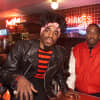Erykah Badu used to ask fans at her concerts to put their phones away, and for a brief time in the mid- and late-aughts, they would listen. Today, it’s a little harder. Phones are more than just phones; they're barely phones, in fact. Asking someone—a distracted co-worker or friend or lover—to put a mobile on silent and slip it into a purse or a pocket means something different now than it did a decade ago. It’s like asking them to put their life on hold. For a celebrity to make that request while lording over an audience from a stage can feel prickly and selfish. At this weekend’s Soul Train Awards, which Badu hosted and performed at, she made a show out of confiscating Tyrese’s phone. It was likely scripted and accordingly un-prickly, but it was somehow almost necessary. At the same event, she staged a phone call with Iggy Azalea. “You’re definitely not rap,” she said in part-jest, part-truth, tacitly acknowledging that phones aren’t all bad—there can also be power and humor in them.
All of those ideas exist in Badu’s newly released mixtape, But You Caint Use My Phone, too. The project feels urgent. Not just because it’s the 44-year-old’s first full-length release in five years, but because it's 2015 and it’s about time someone made a concept album entirely about phones, among the most ubiquitous of human inventions. Over 11 songs and skits, Badu plays the elder statesman, threading together a slew of telephone-related references from the past few decades of popular R&B music. It’s a personal history that might not be unlike your own if you grew up a fan of the genre. On “Mr. Telephone Man” and “U Don’t Have To Call,” for instance, she interpolates songs of the same name by New Edition and Usher, respectively, and refits their sentiments for the iPhone era. But You Caint draws this natural line from The Isley Brothers’ “Hello It’s Me” to Drake’s “Hotline Bling”: anxiety about communication isn’t new, but it’s certainly now.
In those moments, I want to escape, to insulate myself from opinions that infuriate me, from rude comments left in my mentions by Twitter eggs, from nonstop haranguing from struggle rappers and struggle singers and struggle bands and struggle producers confident an unsolicited communication will make them pop. I want to tell those people to spend more energy making better music and less energy trying to convince strangers on the other side of some app’s cold interface to listen to it. I want to tell this to my friends, too. I want to tell it to myself until I never forget, until I only pick my phone up when I need it, until my communication feels worth the energy it eats up in return.
Here’s inevitably what happens when I leave Twitter: I spend 30 days buckling down on work, on friendships, on my piles of neglected reading, on just being a human in a strange world that's getting stranger. I remember things better, I think more clearly, my ideas are stronger, and it’s easier to make creative decisions. I get that same feeling from But You Caint, which Badu recorded alongside 23-year-old Dallas producer Zach Witness in less than two weeks. The maximalist album-making process of yore, during which time it would have taken her two years of writing, recording, arranging, re-arranging, mixing, and mastering to complete the project, is a context made irrelevant by technology, yet I imagine Badu kept her phone down during much of the process.
The tape gradually builds towards the closing track and third single “Hello,” a duet with André 3000. Like every other sound on But You Caint, it was recorded in person on the same microphone in Witness’ bedroom-cum-studio, eschewing the now-standard practice of trading files over the internet, she explained during a listening session ahead of the tape’s release. Badu and 3000 have a long-standing, well-documented relationship that includes a son (whom Badu describes as an A&R for her label) and a series of musical collaborations over the years, yet “Hello" is their first substantial release together. The song is a warm, sunny reimagining of the Isley Brothers’ Todd Rundgren-composed “Hello It’s Me.”
Badu’s version includes similar lyrics—I thought about us for a long, long time/ Maybe I think too much but something's wrong/ Something that said it doesn't last too long, too long—but winds up sounding considerably more optimistic than its source of inspiration. Whereas the original sounds like a pained, one-sided break up song, Badu and 3000 sound more like lovers who have found peace in their relationship, whatever its current state. Andre’s anxieties about love, expressed in a verse stuffed with paranoia, is softened by the loving back-and-forth—don’t change, don’t change, squirrel, they sing to each other like it’s some sort of tender inside joke. Throughout But You Caint, Badu takes existing references, ideas, and technologies, and pulls something new out of them.
As much as she looks backwards, she looks to the future on the tape, too. It's unlikely that the world will ever, ever, ever relinquish the convenience of cell phones. Plus how we gon’ call Tyrone to help us come get our shit, she quips in a camouflaged voice at the end of “Dial’Afreaq.” The line wryly punctuates an interlude vaguely linking cell phone radiation to the extinction of bees, but is a reminder that Badu is not a total luddite, just a moderate in search of zen and happiness amidst all the dial tones, voicemails, and text alerts. She alternately fears for the worst and hopes for the best, hinting at a utopian dreamscape in which technology is available but not wholly absorptive, in which you can hit Siri up for help but you have the chill not to do so 24/7. In which a partner can make you turn your phone off, a friend can wait patiently until you have time to call them back, your hometown’s area code (214 for Badu’s Dallas) still means something. But until that future arrives, you can leave me a voicemail.


